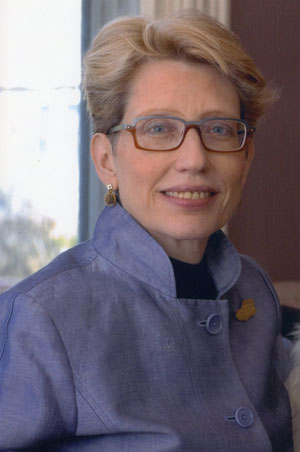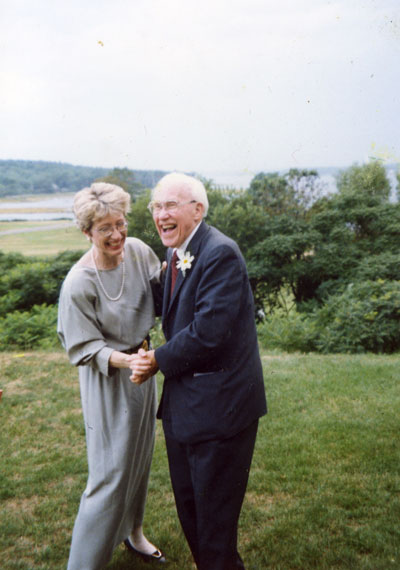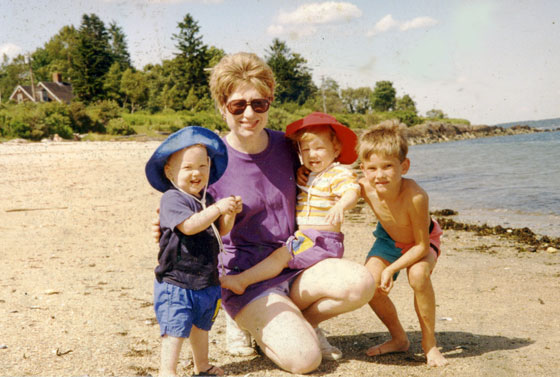Dr. Henrietta Leonard
 Dr. Henrietta Leonard, an internationally
esteemed researcher in child psychiatry and beloved wife of Dr.
Kenneth Rickler and mother of Alexander and Nathaniel, died peacefully
in the early morning hours of Wednesday, August 15, 2007 surrounded
by loving family and friends. Dr. Leonard's death at age 53 followed
a 4 1/2 year battle with ovarian cancer. To the end, she remained
grateful for the many blessings she had received in her life.
Dr. Henrietta Leonard, an internationally
esteemed researcher in child psychiatry and beloved wife of Dr.
Kenneth Rickler and mother of Alexander and Nathaniel, died peacefully
in the early morning hours of Wednesday, August 15, 2007 surrounded
by loving family and friends. Dr. Leonard's death at age 53 followed
a 4 1/2 year battle with ovarian cancer. To the end, she remained
grateful for the many blessings she had received in her life.
Henrietta's chief interest was her family. She was a devoted
wife to her husband, Kenneth Rickler, and a proud and loving mother
to her 16-year old twin sons, Alexander and Nathaniel. She had
a warm and loving relationship with her father Louis F. Leonard
of West Hartford CT, brother Edward Leonard also of West Hartford,
sisters Ann Leonard of Chapel Hill, North Carolina, Susan Leonard
Sullivan of Lovettsville Virginia, and sister-in-law Phyllis Alexander,
their spouses and her nine nephews and nieces. Henrietta was predeceased
by an infant brother, George, and her mother, Elizabeth, who died
in 2003 of ovarian cancer.
Henrietta was born in Hartford, Connecticut on January 6, 1954
and was raised in West Hartford. She attended the University of
Connecticut, obtaining a Bachelor of Science degree in biology
and a Masters degree in biobehavioral science, and then studied
medicine at George Washington University (GWU) School of Medicine
in Washington D.C. After receiving her medical degree in 1982,
Henrietta remained at GWU to complete residency training in general
psychiatry and fellowship training in Child Psychiatry. During
that time she met her husband, Kenneth, and they were married
in 1989.
After completing her child psychiatry fellowship, Henrietta
was awarded a National Research Service Corps fellowship at the
National Institute of Mental Health and began a research career
focused on investigating the cause and treatment of childhood
mental illnesses, particularly pediatric anxiety disorders. Author
of over 100 professional papers, Henrietta was recognized internationally
for her contributions to the field of child psychiatry, including
the discovery with her NIMH colleagues of a unique form of childhood-onset
obsessive compulsive disorder in which symptoms are triggered
by streptococcal infections. In recognition of her many accomplishments,
Henrietta was awarded a tenure-track position at the NIMH in 1994.
In 1995, Henrietta and her family relocated to Providence RI,
where she was named a Professor of Psychiatry and Human Development
at Brown University School of Medicine. Henrietta continued her
research efforts there, receiving more than a dozen grants for
investigations of obsessive compulsive disorder, selective mutism,
and other childhood psychiatric disorders. She also was awarded
two U.S. patents and several local and national research prizes,
including the "Young Investigator Award" from the American
Academy of Child and Adolescent Psychiatry (AACAP). Henrietta
was a dedicated member of the Academy for more than 20 years and
was elected an Academy fellow in 2007.
Henrietta's contributions to the field of child psychiatry
extended far beyond her own research, as she was deeply committed
to the ethical conduct of pediatric research and served on numerous
national committees convened to ensure that the best interests
of the children were met. Henrietta donated much of her time to
local and national scientific review committees and editorial
boards, and served as Editor-in-chief of the Child Psychopharmacology
Update. In addition, Henrietta edited two volumes of Child and
Adolescent Psychiatric Clinics of North America, and co-authored two trade books: "It's Not All In Your Head"
and "Is It 'Just a Phase'?"
co-authored two trade books: "It's Not All In Your Head"
and "Is It 'Just a Phase'?"
Henrietta was Director of Brown's child psychiatry fellowship
training program and the triple-board residency program in psychiatry-pediatrics-child
psychiatry. In that role, she mentored scores of post-doctoral
psychologists, medical students, residents and fellows; and trained
more than 100 child psychiatrists. She was greatly loved and respected
by her trainees who nominated her for numerous mentorship awards;
as well as by her peers who selected her as the department's "Mentor
of the Year" for 2006-2007. Among many other honors, Henrietta
was recognized by the AACAP for her "Outstanding Leadership
and Contributions to the Triple-Board Training Programs".
In addition, the Rhode Island chapter of AACAP recently established
an annual training award to honor Henrietta's legacy as an outstanding
teacher and mentor.
Henrietta was a passionate family genealogist who was able
to trace an ever -expanding tree of family members back more than
twelve generations. She had an abiding love for Chebeague Island,
Maine, her father's childhood home, and visited there every summer
of her life. It is fitting that Henrietta was able to return there
for her final days. The funeral will be held 1pm Saturday, August
18, 2007 at the Chebeague United Methodist Church on Chebeague
Island, Maine, where she will be buried. A memorial service will
be held 1pm Tuesday, August 21, 2007 at Temple Beth El, 70 Orchard
Avenue, Providence, RI. In lieu of flowers, contributions may
be made to the Chebeague Island Recreation Center, 382 North Road,
Chebeague Island, ME 04017 or the Gillette Center for Gynecologic
Oncology (care of Dr. Richard Penson), 55 Fruit St, Yawkey Center,
Boston, Mass. 02114.
Henrietta Leonard will be missed by so many as a clinician,
researcher, educator, mentor, and friend; and above all, as a
daughter, sister, wife and mother.

Washington Post Article about Henrietta
on August 17, 2007
Henrietta Leonard, 53; Child Psychiatrist
By Adam Bernstein
Washington Post Staff Writer
Friday, August 17, 2007; Page B07
Henrietta Leonard, 53, a child psychiatrist who conducted early
and important studies showing that medication and behavioral therapy
were effective treatments for childhood anxiety disorders, died
Aug. 15 at her family's home in Chebeague Island, Maine. She had
ovarian cancer.
Dr. Leonard's research career began in the mid-1980s at the
National Institute of Mental Health and continued at Brown University,
where she spent the past 12 years as a medical school professor
of psychiatry and human development.
Henrietta Leonard studied obsessive-compulsive disorder.
She ran some of the nation's first treatment studies of obsessive-compulsive
disorder and helped discover a variant of the disorder in which
symptoms are triggered by untreated streptococcal infections.
Her work had a major influence on the medical community, particularly
among child psychiatrists and pediatricians.
Susan Swedo, chief of behavioral pediatrics at the mental health
institute, said she and Dr. Leonard spent more than two decades
conducting research to find medical models for obsessive-compulsive
disorder.
They demonstrated that a subgroup of children studied had obsessive-compulsive
symptoms after streptococcal infections -- much as rheumatic fever
and the neurological disorder Sydenham's chorea (also known as
Saint Vitus's dance) are triggered by an untreated strep throat.
They found that if caught soon enough, obsessive-compulsive
disorder can be treated with antibiotics instead of psychotropic
drugs and that future episodes can be prevented by an antibiotic
administered to prevent strep infections.
Their findings appeared in Lancet and the American Journal
of Psychiatry and opened the door to similar examinations of other
psychiatric disorders, including attention deficit disorder and
depression.
Dr. Leonard was a native of Hartford, Conn., and a biology
graduate of the University of Connecticut, where she received
a master's degree in biobehavioral science.
She graduated in 1982 from George Washington University's medical
school, where she also completed residency training in general
psychiatry and fellowship training in child psychiatry.
She was awarded a National Research Service Corps fellowship
at the National Institute of Mental Health and began a research
career focused on investigating the causes and treatments of childhood
mental illnesses, particularly pediatric anxiety disorders.
After arriving at Brown, Dr. Leonard received more than a dozen
grants for investigations of obsessive-compulsive disorder, selective
mutism (in which a child's overwhelming anxiety or shyness affects
their ability to speak) and other childhood psychiatric disorders.
She directed the medical school's child psychiatry fellowship
training program and the triple-board residency program, in which
residents study for five years to become pediatricians, psychiatrists
and child psychiatrists. At Brown, she trained more than 100 child
psychiatrists.
She served on professional bodies nationwide, wrote more than
100 professional papers and was editor in chief of the Brown University
Child & Adolescent Psychopharmacology Update, a newsletter.
This year, she was elected a fellow of the American Academy of
Child and Adolescent Psychiatry.
With Swedo, she co-wrote two books: "It's Not All in Your
Head: Now Women Can Discover the Real Causes of Their Most Commonly
Misdiagnosed Health Problems" (1996) and "Is It 'Just
a Phase'? How to Tell Common Childhood Phases From More Serious
Disorders" (1998).
Survivors include her husband of 18 years, Dr. Kenneth Rickler,
and their twin sons, Alexander Rickler and Nathaniel Rickler,
all of Providence; her father, Louis F. Leonard of West Hartford,
Conn.; a brother, Edward Leonard of West Hartford; and two sisters,
Ann Leonard of Chapel Hill, N.C., and Susan L. Sullivan of Lovettsville.
 Dr. Henrietta Leonard, an internationally
esteemed researcher in child psychiatry and beloved wife of Dr.
Kenneth Rickler and mother of Alexander and Nathaniel, died peacefully
in the early morning hours of Wednesday, August 15, 2007 surrounded
by loving family and friends. Dr. Leonard's death at age 53 followed
a 4 1/2 year battle with ovarian cancer. To the end, she remained
grateful for the many blessings she had received in her life.
Dr. Henrietta Leonard, an internationally
esteemed researcher in child psychiatry and beloved wife of Dr.
Kenneth Rickler and mother of Alexander and Nathaniel, died peacefully
in the early morning hours of Wednesday, August 15, 2007 surrounded
by loving family and friends. Dr. Leonard's death at age 53 followed
a 4 1/2 year battle with ovarian cancer. To the end, she remained
grateful for the many blessings she had received in her life. co-authored two trade books: "It's Not All In Your Head"
and "Is It 'Just a Phase'?"
co-authored two trade books: "It's Not All In Your Head"
and "Is It 'Just a Phase'?"